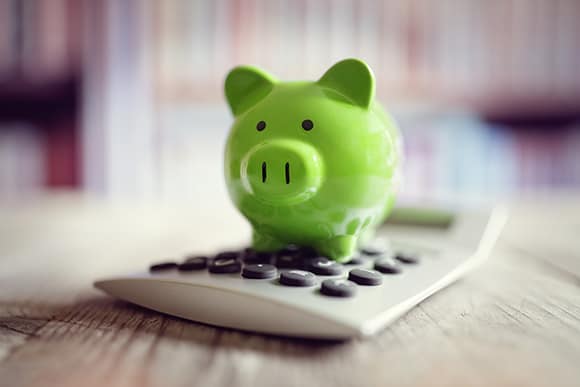Having principles is all well and good, but ‘doing your bit for the environment’ has a reputation for being expensive or insanely impractical (fancy living off-grid in a yurt anyone?).
But there are lots of simple things you can do to save energy and boost your green credentials – here’s how.
1) Switch to LED lightbulbs – Yes, they do cost more than halogen bulbs, but they also last longer and could help cut your energy bill by £35 a year according to the Energy Savings Trust.
2) Turn your thermostat down by one degree – This is easy to do, has immediate results and cuts your energy usage by around £80 every year.
3) Keep doors shut – Open doors mean wasting precious heat in areas where it’s not needed.
4) Wash clothes at 30 degrees – Unless clothes are super mucky, washing at 30 degrees is enough to keep them clean and fresh. You’ll cut your energy use by up to 40% over the year.
5) Do one less wash each week – Cutting back on laundry can save you a fiver’s worth of energy each week. If ever there was a good excuse to ditch some housework, surely this is it?
6) Fix dripping taps – Nobody likes a big drip, so change the washers and tighten the taps. You could save between four and 90 litres per day (depending on just how bad the leak is).
7) Only fill the kettle with what you need – Only boiling what you need could save about £6 worth of energy every year. That’s enough for some decent cake to go with your tea.
8) Use draft excluders – Draught-proofing windows with foam tape and doors with excluders can reduce energy use by up to £20 per year. If you’re really keen, you can make your own draught excluders for doors. Simply stitch together two lengths of fabric to make a sausage shape and stuff it with old tights and odd socks.
9) Waste less food – Freezing leftovers means saving money on food and cutting your carbon footprint by reducing car journeys to the shops.
10) Don’t standby – Most electrical items can be unplugged at night. Doing so can save £30 of energy a year.
11) Spend less time in the shower – Cutting down the length of your morning shower by just one minute can lower energy use by £7 per person every year. It’ll also give you an extra 60 seconds in bed. To cut water use even more, think about replacing existing shower heads with low-flow versions.
12) Use a slow cooker – Put it on in the morning before work and come back to a home cooked meal. Newer models only use as much energy as a lightbulb (an energy efficient one, of course).
13) Set security lights on timers – Being security conscious doesn’t mean illuminating your whole street all night. Set timers or, better still, invest in some motion sensor lights instead. You’ll get through fewer bulbs, save energy and reduce your electricity bill.
14) Banish chimney draughts – Get a chimney balloon or draught excluder to fill in your chimney cavity when you’re not using it. It will stop cold air flowing in, meaning you won’t need to crank up the heating and increase your energy use.
15) Insulate your hot water tank – Save energy by installing an insulating jacket to reduce heat loss. Your boiler won’t have to work so hard to heat the water and maintain its optimum temperature.
16) Air dry clothes – It’s best to use an indoor (or outdoor) airer to dry your clothes in an eco-friendly way. But if you’ve got young kids and need to dry clothes fast, a heated indoor airer could be a compromise. They typically use 60% less energy per hour than a tumble dryer.
17) Put rugs over bare floorboards – Tiles and bare wood look great but feel cold under foot. Some well-positioned rugs will not only give your home a fresh look, but also minimise draughts and stop you from turning up the heat.
18) Plant trees and hedges – If you can’t stand the heat in the summer, instead of using air conditioning or electric fans, try planting some tall hedges or trees where the sun hits your house. It might take time before you feel any benefit, but in the meantime, you can bask in smugness for boosting the number of plants in the world.
19) Check the efficiency of appliances – If you’re splashing out on new electricals, don’t underestimate how much you could save by choosing the most energy efficient models. For example, an A+++ fridge freezer will use £300 less electricity than one rated A+.
20) Use a smart meter – These gadgets have had a mixed reaction in the press, with critics saying potential energy savings are minimal. However, they help you see how much electricity you use and how much individual items cost to power. This eye opener may just inspire you to make some energy saving changes.
Being green and doing your bit to save the Earth doesn’t have to cost it. As our top tips prove, the changes you make don’t have to be drastic. With just a few simple improvements, not only will your bank balance thank you, but the planet will too.







